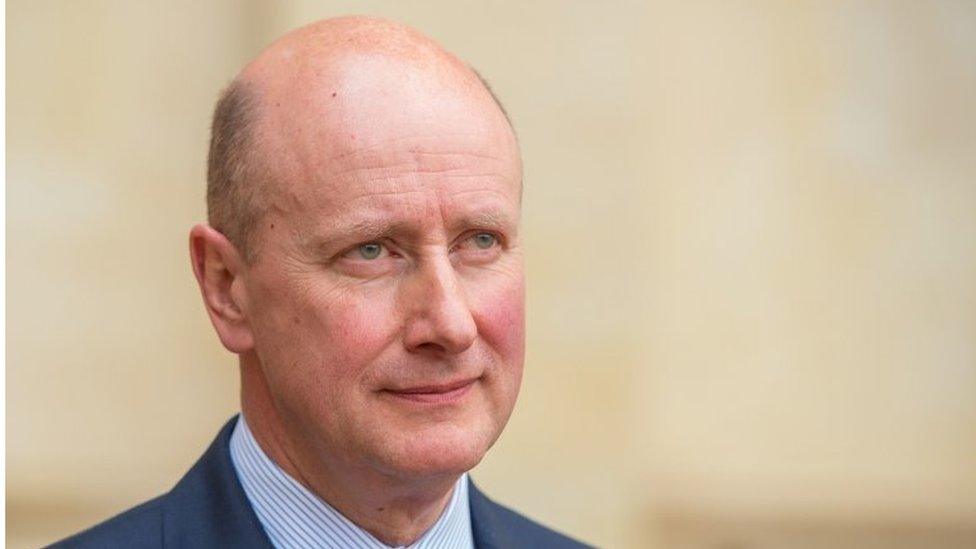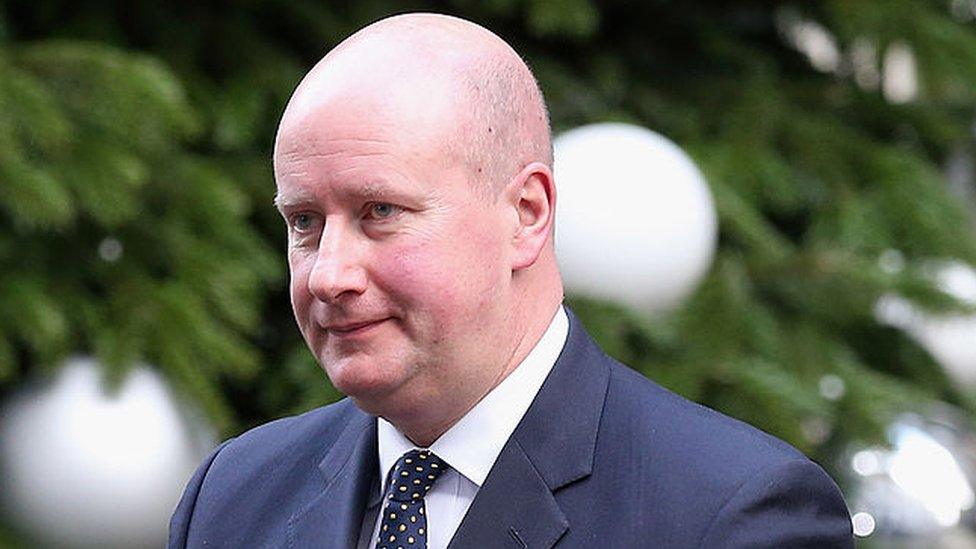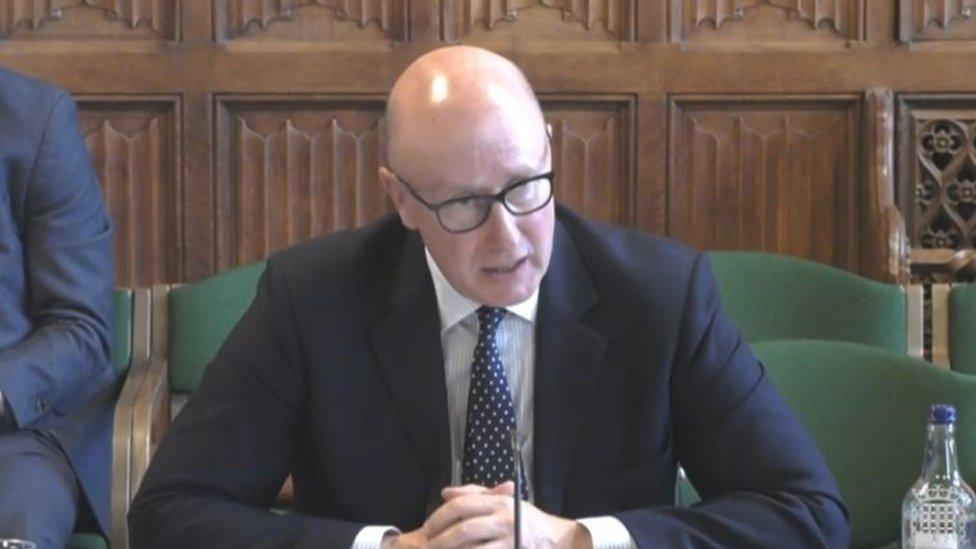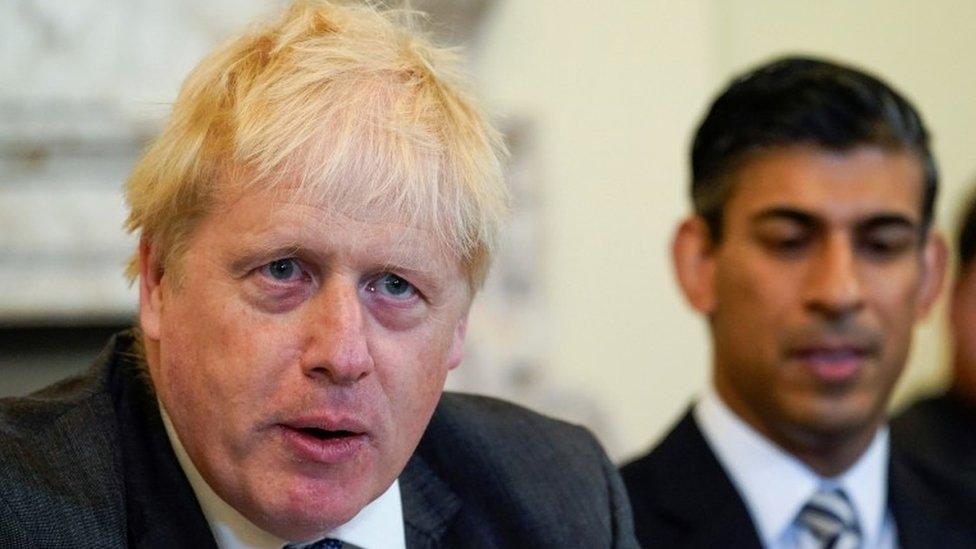Boris Johnson urged not to scrap ethics adviser role
- Published
- comments

Boris Johnson has been urged not to scrap the role of ethics adviser after Lord Geidt resigned from the job.
Following his resignation, No 10 said they would review the position before deciding on making a new appointment.
Lord Evans, chair of the Committee of Standards on Public Life, warned that scrapping the job would "further damage public perceptions of standards".
Meanwhile, Lord Geidt has now said his reasons for resigning were "far wider" than some have suggested.
Downing Street said it was right for the PM to take time to reflect on whether Lord Geidt should be replaced.
A Number 10 spokesman said: "It may be that the prime minister decides to make a like-for-like replacement, or it might be that we set up a different body that undertakes the same functions."
Business Minister Paul Scully said he would feel "comfortable" if a new ethics adviser were not appointed.
Speaking to Sky News he said there would still need to be a "mechanism that ensures the prime minister and me as a minister are held to the highest standards".
Lord Geidt stepped down from his role on Wednesday, accusing the prime minister of putting him in an "impossible and odious position" over an issue he believed would amount to a breach of the ministerial code - the rules about standards in government.
In a letter seen by BBC News on Friday evening, he has now elaborated on why he quit.
Steel tariffs 'a distraction'
Lord Geidt told the chairman of the Public Administration and Constitutional Affairs Committee, Conservative MP William Wragg, there had been "confusion about the precise cause of my decision".
He said his concern - expressed in his letter to the PM - about the government's policv on steel tariffs was "a distraction" and "simply one example of what might yet constitute deliberate breaches by the United Kingdom of its obligations under international law".
"My letter has been interpreted to suggest that an important issue of principle was limited to some narrow and technical consideration of steel tariffs.
"The cautious language of my letter may have failed adequately to explain the far wider scope of my objection."
Lord Geidt added that former Cabinet Secretary Lord Butler had represented his position "precisely" when he said, in a BBC interview on Thursday, that Lord Geidt had believed he should not "be asked to give advanced cover to the prime minister where there is contemplation of doing something that may be in breach of international law".
He is the second ethics adviser to quit under Mr Johnson's leadership, after Sir Alex Allan who left in 2020.
Sir Alex told BBC Newscast he believed Lord Geidt had partly resigned over a "combination of the issues" concerning parties in Downing Street during the coronavirus lockdown.
He said it would be "very hard" to find a replacement to step into the role "exactly as it is".
Asked about recruiting a new adviser, a Downing Street spokesman said "the prime minister's view is that what is absolutely vital is that there is a way to police those standards", but added "the exact mechanism to do that is something he wants to reflect on."
The spokesman said Mr Johnson would not begin to search for a new advisor until he had decided whether the role need changing.
Lord Evans of Weardale - whose committee advises the prime minister on standards - said the decision "may be driven by concerns about the difficulty of finding a successor for this sensitive and important role".
But, he added: "Removing this independent voice on standards issues at the heart of government could risk further damage to public perceptions of standards.
"At a time of heightened concern about standards in public life, any change to the oversight of ministerial behaviour must be stronger, not weaker, than we have now."
Lord Geidt "wouldn't have taken this decision lightly" - former PM adviser
Conservative MP John Penrose - who quit as the government's anti-corruption tsar last week - told the BBC's Today programme the prime minister "shouldn't be weakening the role" and that getting rid of it altogether would be a "big mistake".
"The PM is currently overdrawn on his account with both the voters and the parliamentary party. They need to show they are serious about this," he said.
Opposition parties reacted angrily to suggestions No 10 may not replace Lord Geidt.
Labour's Angela Rayner said there was "no ethics in Downing Street under this prime minister" while Liberal Democrat leader Sir Ed Davey said: "Boris Johnson has no ethics, so not surprising he wants to scrap his ethics adviser."
The FDA union - which represents senior civil servants said that if the prime minister did not intend to replace Lord Geidt, "then he must immediately put in place measures that ensure a civil servant can, with confidence, raise a complaint about ministerial misconduct".
"Ministers cannot be exempt from the standards that apply to civil servants - and any modern workplace - when it comes to their conduct."
Related topics
- Published16 June 2022

- Published16 June 2022

- Published14 June 2022
